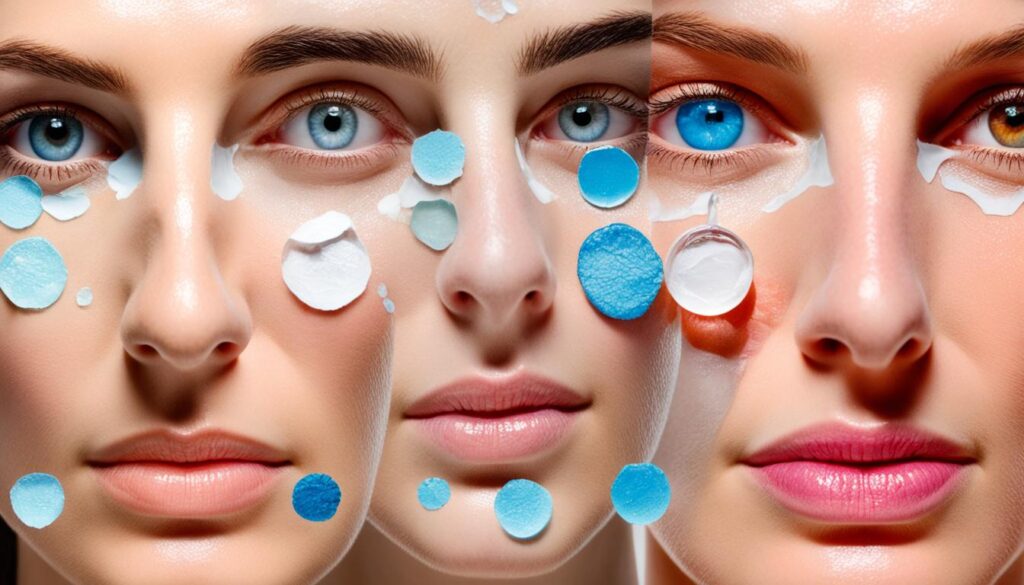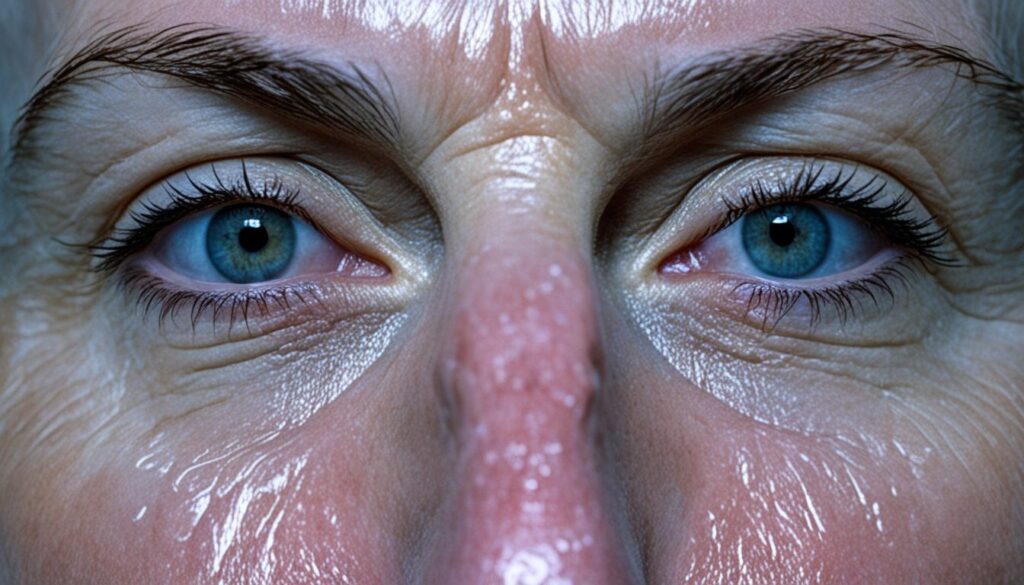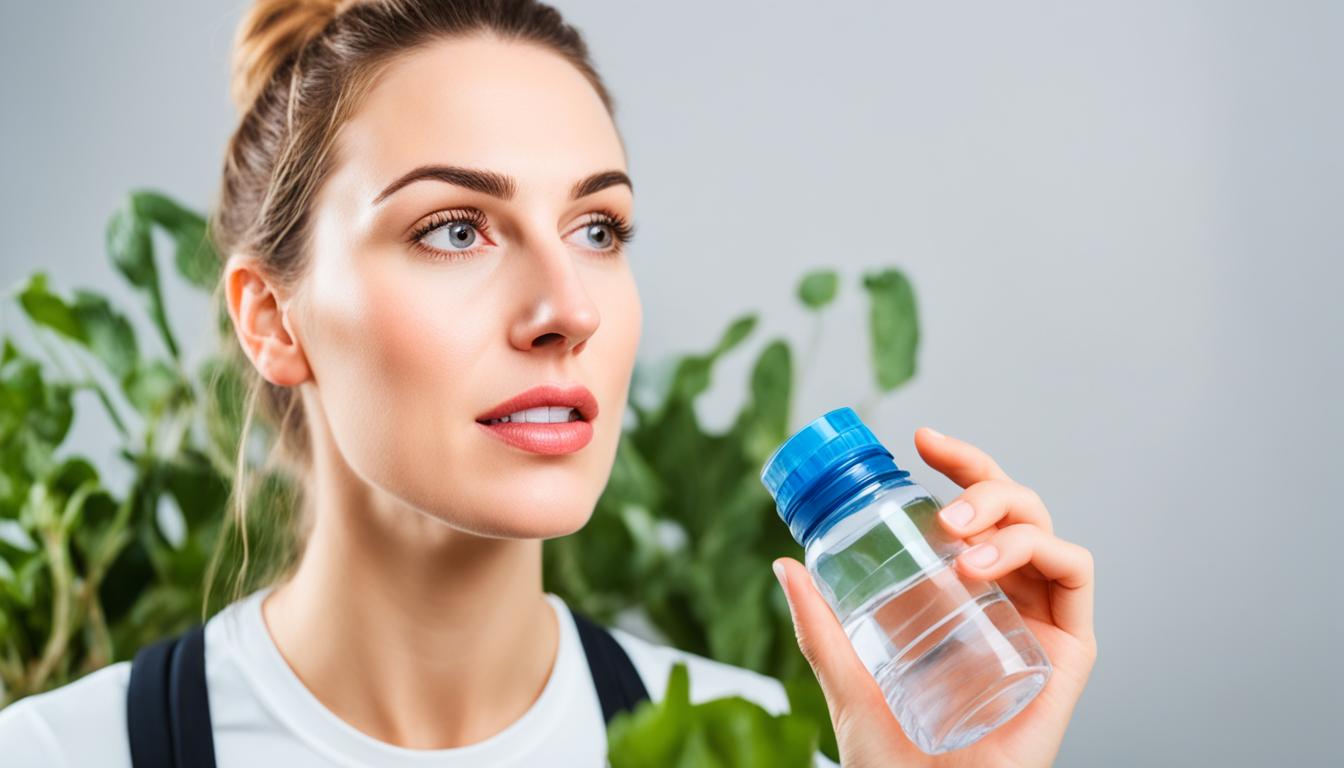Feeling thirsty isn’t always a good sign that you need more water. It depends on your age, where you live, and how active you are. Even losing a small amount of your body’s water, about 1.5%, can cause serious issues. This includes fainting and increasing your chance of accidents and injuries1. Dr. Samuel Nickles warns other signs, like brain fog, being very hungry, bad breath, and dry skin, could point to dehydration.
Drinking enough water might also help keep migraines away. Dehydration can lower your blood pressure and affect the blood vessels in your brain. This can cause headaches1. You can tell how hydrated you are by the color of your urine. If it’s a pale straw-yellow, you’re probably okay. But if it’s darker, you might be dehydrated1.
Understanding Dehydration and Its Impact on Your Health
Dehydration occurs when your body doesn’t have enough water to work properly. This can cause serious health problems, including issues with your heart. It’s crucial to spot dehydration early and act to avoid health risks.
What is Dehydration?
Feeling thirsty is one of the first signs you’re dehydrated. But there are other signs too. You might notice your urine is darker, or feel dizzy, tired, and have a dry mouth.
Dehydration can happen if you don’t drink enough, especially in hot weather, after intense exercise, or when you’re sick and losing fluids.2 Active people need to be especially careful. They should drink 16 to 20 ounces of water before going outside. Then, they should sip 6 to 12 ounces every 10 to 15 minutes during physical activities3.
Common Causes of Dehydration
Dehydration can be caused by not feeling as thirsty when you’re older, sweating a lot, certain meds, and drinks that make you pee more, like alcohol and caffeine. Though drinks like coffee and tea help keep you hydrated, don’t overdo it32.
Kids might get dehydrated from bad diarrhea or throwing up lots. Older adults often need to drink more water because their bodies hold less water and they take more meds. Knowing how to drink enough water is key to avoiding serious health issues from dehydration.
After sweating a bunch, drinking another 16 to 24 ounces of water is a good idea3. Eating foods with a lot of water in them and drinking water steadily throughout the day also help32. Even small illnesses in older adults, like infections, can lead to dehydration. For severe dehydration, get medical help right away2.
Signs of Dehydration: Why You Need to Drink More Water
It’s important to know the early signs of dehydration to stop it from getting worse. You might feel thirsty, see dark urine, feel dizzy, or be very tired. You might also have headaches, dry mouth, sunken eyes, or pee less. If you see these signs, drink more water to keep healthy and prevent worse symptoms. Always have a water bottle with you. And, pick water over sugary drinks to keep hydrated3.

If you start feeling confused, very tired, or you faint, get help right away. For those who are active, like in sports, make sure to drink water before and during your activity. Try to drink 16 to 24 more ounces after you’re done. This will replace any lost fluid and help keep you in good shape3.
Older adults are more at risk of dehydration because they naturally have less water in their bodies. Some health conditions or medicines can make this risk even higher. If they vomit, have diarrhea, get a fever, sweat a lot, or pee more, they could get dehydrated quickly2. Knowing these signs is key to staying healthy.
Small changes in your daily routine can boost your hydration. A little lemon or lime in your water, or some flavored drink mixes, can make it easier to drink water. But remember, drinks like alcohol and coffee don’t help you stay hydrated. Go for kinds of food and drinks that are mostly water, like soups, fruits, and veggies, to keep hydrated all day3.
Physical Symptoms of Dehydration
It’s vital to know the signs of dehydration for our health. Symptoms vary but can often mean a dry mouth, bad breath, dry skin, and confusion.
Dry, Sticky Mouth and Bad Breath
Dehydration makes us produce less saliva. This leads to a dry mouth and smelly breath. Eating foods high in fiber and water, and chewing sugar-free gum, can help make saliva, keeping us moist and smelling sweet.
Dry, Flaky Skin
Not drinking enough water shows on our skin. This could mean the skin loses its plumpness and looks dull. Staying hydrated helps keep the skin looking and feeling good. If you’re active, make sure to drink enough water and fluids to fight off dry skin3.

Difficulty Concentrating and Brain Fog
Dehydration can mess with our thinking too. It can make us feel forgetful and unable to focus. Drinking enough water daily is key to keeping our mind sharp. The recommended amount is about eight glasses daily. But, it may change depending on your weight, how active you are, and the weather3.
Keeping a water bottle handy, choosing water as your main beverage, and adding flavors with fruits or mixes are good habits. They all help in staying healthy and benefiting from regular hydration.
If you want to learn more about hydration and how to spot signs of dehydration, check out resources like the Cleveland Clinic’s guide on dehydration.
How to Recognize Dehydration from Your Urine Color
Your urine color shows if you’re hydrated enough. A light straw-yellow is good, but amber or darker means you should drink more. Very dark urine could be a sign of severe dehydration or health problems and needs a doctor’s check.
For staying hydrated, the Institute of Medicine recommends 13 glasses daily for men and nine for women. But, these amounts change for everyone based on how active they are and the weather. If you’re active, drink 16 to 20 ounces before outdoor activities. Then, have six to 12 ounces every 10 to 15 minutes while doing these activities3.
After being active, it’s key to drink another 16 to 24 ounces to rehydrate3. Water is best for regular activities. But for long or tough workouts, sports drinks with electrolytes are needed3. Be careful with drinks that have alcohol or caffeine because they can dehydrate you. Always drink plenty of water if you have these drinks.
Noticing your urine color can be a good way to check if you’re drinking enough. Although the rule of eight glasses daily is helpful, everyone’s needs are different. It depends on your weight, age, and how active you are3. Keeping hydrated is crucial for good health. It all starts with listening to what your body tells you.




